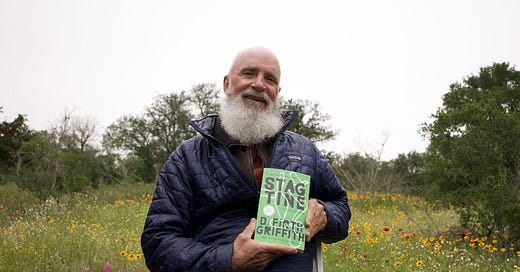Stagtine, 2. Foreword by Fred Provenza
A Foreword written and read by the Dr. Fred Provenza.
To view a full (slowly released) Table of Contents to Stagtine, my latest book made available to you all in both paperback, digital, and audiobook formats, click here!
Once a species reliant on nature for food, medicine, clothing, and shelter, Homo sapiens is in the process of being consumed by the fossil fuel-based agricultural and technological economies that enabled our separation from the natural world that nourishes and sustains all life, including us humans. Fossil fuel-based economies, which are grounded in competition for manufactured scarcity, rather than cooperation around natural abundance, are causing man-made shortages of unpolluted air, clean water, fertile soil, biodiversity, and wholesome foods. It is not hyperbole to state that we may end up among the many species now facing their final days on Earth, no different from the over ninety-nine percent of species who visited this planet and are now extinct.
Fossil fuels enabled human populations to rise precipitously from two million people in 10,000 BCE to a little less than a billion in 1800 to nearly eight billion people today. Our populations expanded exponentially during the twentieth century in no small part due to fossil fuels and industrial agriculture. Humans and the animals in our care now utterly dominate the planet.
Humans (thirty-six percent) and our livestock (sixty percent) make up an astounding ninety-six percent of all the mammals on Earth. Domestic chickens account for seventy percent of all the birds on this planet. Nearly half (forty-four percent) of the world’s habitable land is used for agriculture, in total 48 million square kilometers (18.5 million square miles). Croplands make up one-third of agricultural land, and grazing land makes up the remaining two-thirds.
It is easy to understand why we embraced fossil fuels. The energy in a barrel of oil is equivalent to ten to twelve years of hard labor by a fit human. Fossil fuels enabled people in agriculture to evolve from long days of back-breaking work into an industry where machines do most of the work. Globally, we now consume 100 million barrels of oil each day across all human activities. The United States population of nearly 330 million used 20 million barrels of oil daily in 2022.
Fossil fuel-based food production systems have come at great costs ecologically, socially, and economically. To produce one calorie of food now requires two calories of fossil fuels for machinery, fertilizers, herbicides, and insecticides. We use another eight to twelve calories to process, package, deliver, store and cook modern food. No species can survive by expending ten to fourteen calories to obtain a single calorie of energy and neither can we. With the uncertain availability and prices of fossil fuels a concern and the transition to clean energy a necessity, we have an opportunity to grow nutritious foods in ways that nurture our ties with life on Earth.
To keep reading, you can transition today to a paid member for 50% off and receive a Paperback copy of Stagtine at no extra cost! You’ll also be given access to our twice-monthly, live Zoom call!
Keep reading with a 7-day free trial
Subscribe to Unshod to keep reading this post and get 7 days of free access to the full post archives.





